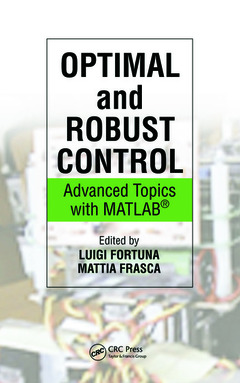Optimal and robust control Advanced Topics with MATLAB®
Coordonnateurs : Fortuna Luigi, Frasca Mattia

Luigi Fortuna is a Full Professor of System Theory at the University of Catania, Italy. He was the coordinator of the courses in electronic engineering and Head of the Dipartimento di Ingegneria Elettrica Elettronica e dei Sistemi (DIEES). Since 2005, he has been the Dean of the Engineering Faculty. He currently teaches complex adaptive systems and robust control. He has published more than 450 technical papers and is the coauthor of ten scientific books. His scientific interests include robust control, nonlinear science and complexity, chaos, cellular neural networks, soft-computing strategies for control and robotics, micronanosensor and smart devices for control, and nanocellular neural networks modeling. Dr. Fortuna is an IEEE Fellow.
Mattia Frasca received his PhD in Electronics and Automation Engineering in 2003, at the University of Catania, Italy. Currently, he is a research associate at the University of Catania, where he also teaches systems theory. His scientific interests include robust control, nonlinear systems and chaos, cellular neural networks, complex systems, and bio-inspired robotics. He is involved in many research projects and collaborations with industries and academic centers. He is also a referee for many international journals and conferences. Dr. Frasca was on the organizing committee of the 10th Experimental Chaos Conference and was co-chair of the 4th International Conference on Physics and Control. He is the coauthor of three research monographs, has published more than 150 papers in refereed international journals and international conference proceedings, and is the coauthor of two international patents. He is also a Senior Member of IEEE.
For more information on Dr. Frasca’s work, see his web page at the University of Catania.
Date de parution : 02-2012
Ouvrage de 252 p.
15.6x23.4 cm
Disponible chez l'éditeur (délai d'approvisionnement : 13 jours).
Prix indicatif 140,36 €
Ajouter au panier

